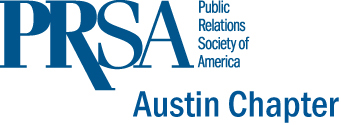|

PRSA Austin: Advice for Young Pros Tackling the Job Market
It’s graduation season at universities across the country, and we know that grads often have questions and anxiety about entering the job market. PRSA Austin has your back with these tips and insider secrets to help you transition from college to the professional world and spread your wings as a PR pro.
“Joining professional organizations like PRSA and others similar to it will help you greatly expand your network and your industry knowledge. Joining groups not only helps you meet people in your community but also helps you continue learning and expanding on your skills for years to come.”
Angela Navarro, Events & PR Manager, Downtown Austin Alliance
PRSA Austin President
“With a robust economy, there will be jobs available for you to be somewhat choosy. However, getting that first job in PR is probably the most challenging of your career. That’s why so many advise internships to give you a leg up on the entry-level position you need. If you enter the job market during a down economy, you can’t be choosy. Try something to get into the business and wait for the market to pick up again to go find a second job closer to your personal goals.”
Grace Capwell, Global Public Relations Manager, Emerson
PRSA Austin Board Chair - APR
“During the interview, demonstrate that you understand the tasks and expectations of an entry-level role by focusing on your mastery of basic skills. Entry-level positions spend most of their time researching, organizing, reporting and writing. Too often I hear recent graduates highlight their strategy skills when I really need someone who is a strong writer and organizer."
Michelle Hargis, Senior Account Director, Mercom Communications
PRSA Austin Board Chair - ProAm Day
“Network, network, network! Connect with your college professors and stay in touch with them after you graduate. Keep track of fellow students as they launch and build their careers — you will be surprised how many people you met in college can lead to jobs even years down the road. Connect with pros in organizations and make LinkedIn your top tool for finding connections who work in a dream city or in a dream job. Don’t be afraid to reach out to professionals for advice because most people really want to help others succeed!”
Debra Price, Assistant Professor of Practice, Texas State University
PRSA Austin Director-at-Large - Communications
“In a competitive public relations job market, the ability to demonstrate that you have practiced creative writing skills may be the deciding factor in whether you are selected from among a field of graduates who are seeking employment.”
Larry Springer, Public Affairs Consultant, Larry Springer Consulting LLC
PRSA Austin Director-at-Large - Assembly Delegate
“Use your LinkedIn! Everyone who you are connected with are your biggest supporters and want you to succeed. Value your connections and don’t be afraid to reach out, ask questions or message fellow industry professionals. You never know who may have a job opening, internship or even just a friend who understands the work we PR professionals do every day.”
Blake Pousson, Account Executive, ECPR Texas
PRSA Austin Director-at-Large, Programming
“Always, always, always trust your gut. The first few jobs won't be perfect, but they’ll be good enough. However, if any don’t feel right, even if you can’t figure out why, it’s okay to leave! When you trust your gut, the universe takes care of you.”
Fabiana Meléndez Ruiz, Founder & CEO, Refuerzo Collaborative
PRSA Austin Board Chair - Ethics
Industry Secrets We Wish Someone Had Shared
“I wish someone had told me how much the first decade of professional experience influences the rest of your career. In other words, combine your PR life with your personal interests, or what gives you a deep sense of purpose, as early on as possible. This will help set a trajectory into the arena where you want to work.”
Grace Capwell, Global Public Relations Manager, Emerson
PRSA Austin Board Chair - APR
“Having hands-on experience is essential. If you did not participate in an internship before graduation then consider accepting an intern role or fellowship role to get your foot in the door. Sometimes, these internships can turn into full-time positions, especially if you prove yourself. It helps to keep an open mind when looking at your prospects. You may not land your dream job right out of college, but considering all the options could place you on a path that you never expected to follow but that you actually enjoy.”
Michelle Hargis, Senior Account Director, Mercom Communications
PRSA Austin Board Chair - ProAm Day
“Be confident in yourself and your abilities, and be ready to say ‘yes’ when opportunities open up in your career. My career has taken directions that I didn’t even dream of when I graduated college. There were times when I stood in my own way because I felt inferior or feared taking a risk. But every time I did take a career risk it always paid off, and it has led to rich experiences that I wouldn’t trade for the world.”
Debra Price, Assistant Professor of Practice, Texas State University
PRSA Austin Director-at-Large - Communications
"Submitting resumes through job listings is a necessary but often futile effort. Leveraging your connections from internships and networking is more likely to pay off. The PR community in Austin, and in Texas, is very small and a referral from a colleague will at least get you an interview."
Michelle Hargis, Senior Account Director, Mercom Communications
PRSA Austin Board Chair - ProAm Day
“Embrace sharing your professional journey on LinkedIn. Whether it's attending conferences, insights from books and podcasts, or celebrating your accomplishments, don't hold back. I see LinkedIn as an extension of your resume—while there are details that may not fit on a CV, having them online for others to discover adds a compelling layer for potential employers.”
Angel Leverett, Director of Marketing & Communications, Austin Habitat for Humanity
PRSA Austin Board Chair - Diversity Equity & Inclusion
“There are no dream jobs. No one job is ever going to fulfill all of your needs, and that’s okay! It’s important to find organizations outside of work that will 'fill your cup.' Your dream job is really the one you cobble together through having outlets for all of your interests.”
Fabiana Meléndez Ruiz, Founder & CEO, Refuerzo Collaborative
PRSA Austin Board Chair - Ethics
“Seek out variety in your public relations experience. As you progress in your career, do not be afraid to move from an internal communications role to a media relations role to a social media role and so on. I am reminded of the Trevanian quote when someone tells me they have multiple months or years of experience as a PR professional: ‘Do not fall into the error of the artisan who boasts of twenty years experience in craft while in fact he has had only one year of experience–twenty times.’"
Larry Springer, Public Affairs Consultant, Larry Springer Consulting LLC
PRSA Austin Director-at-Large - Assembly Delegate
|


